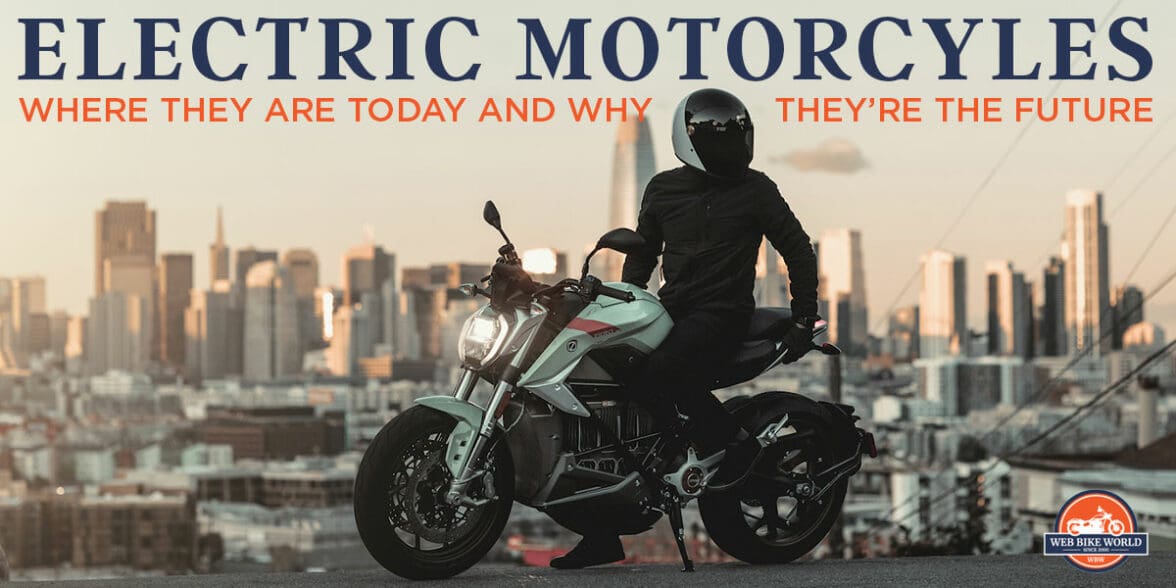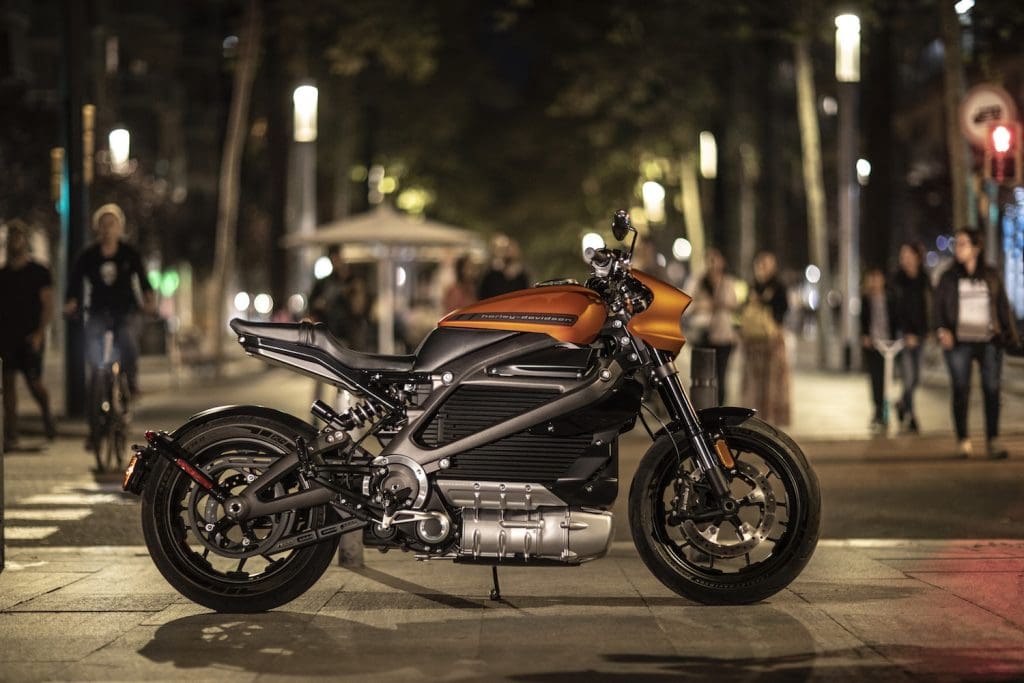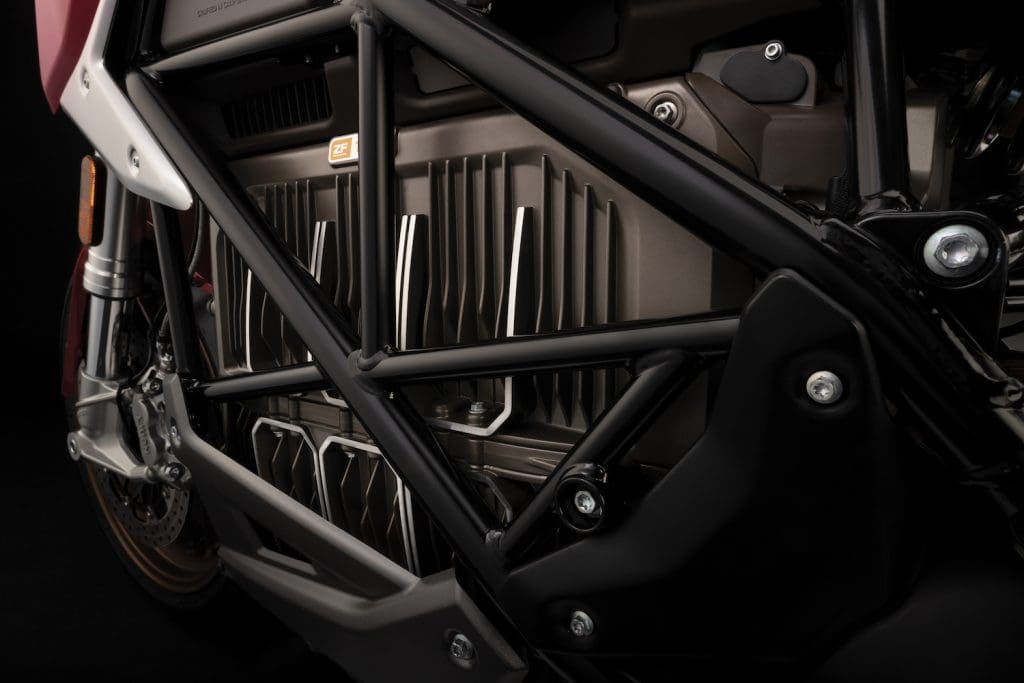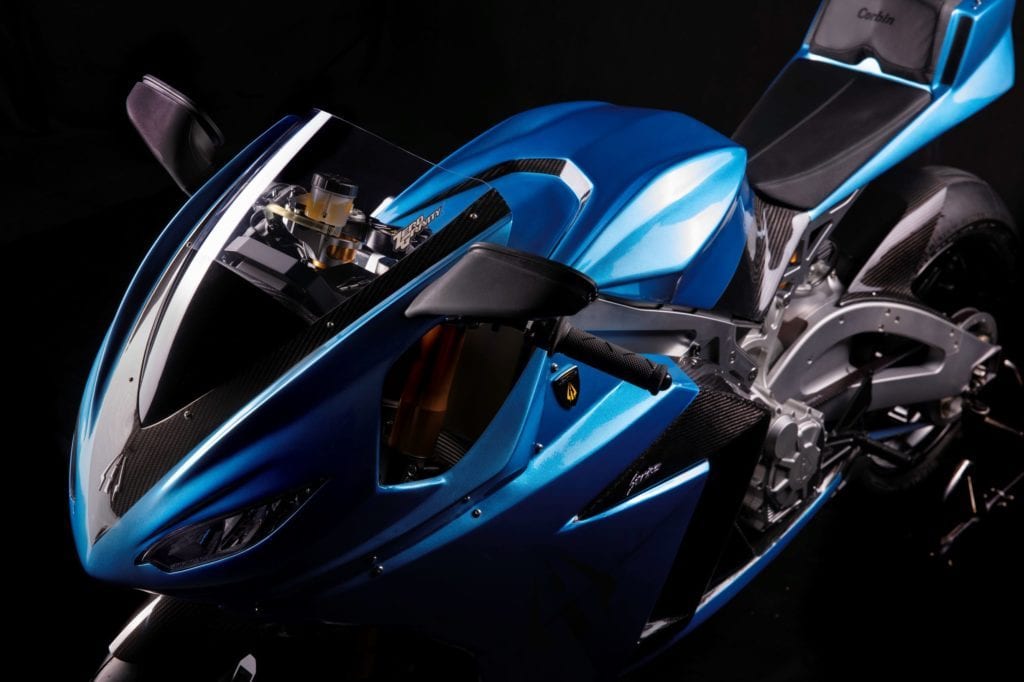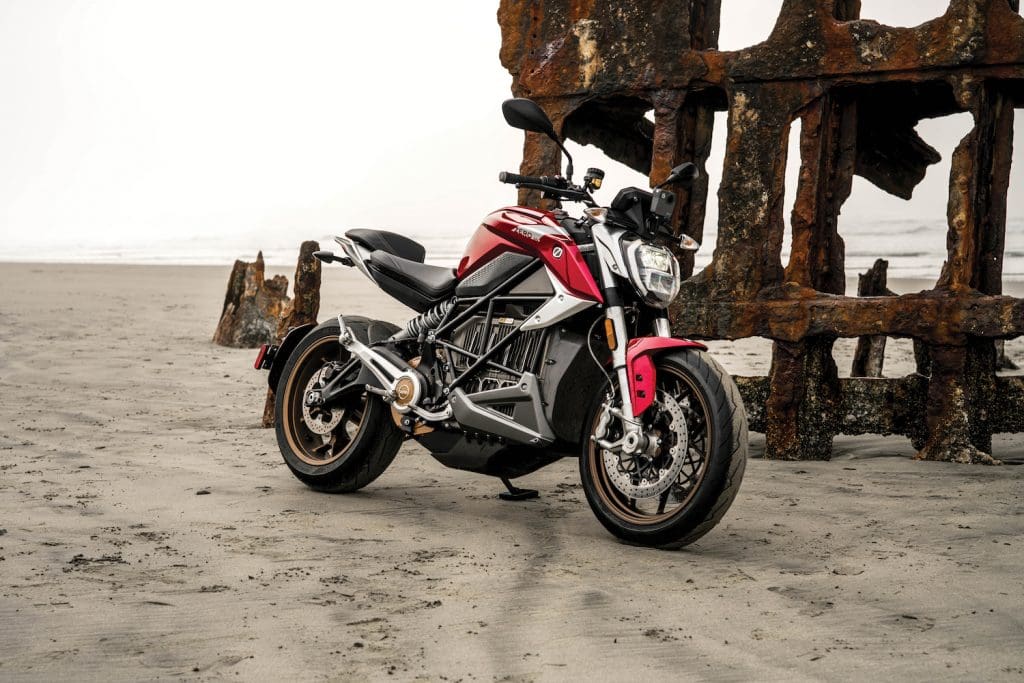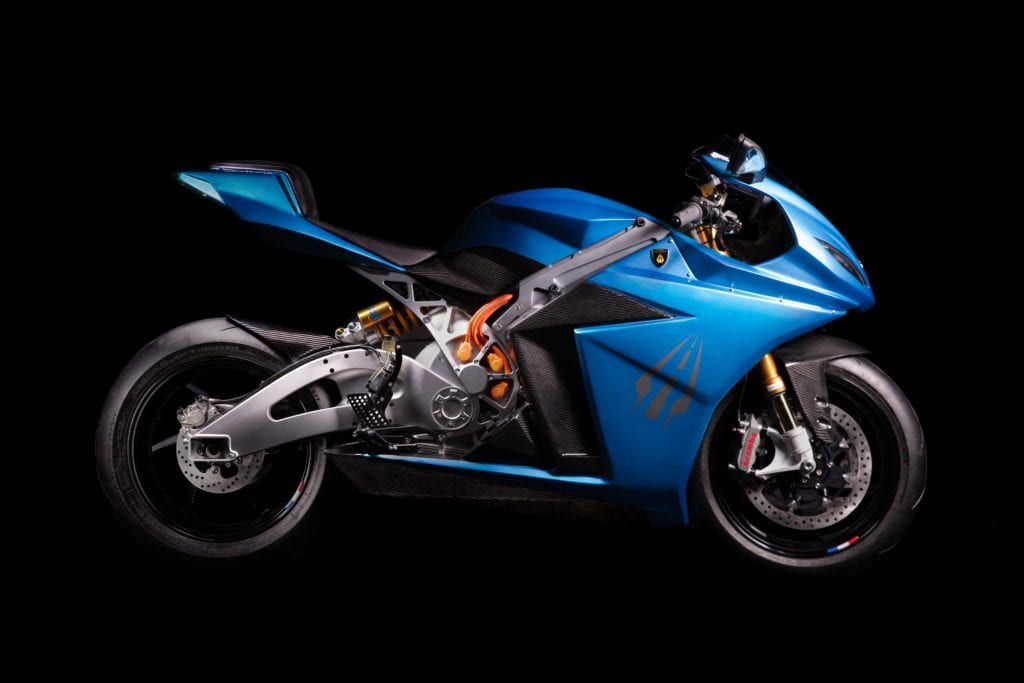Update: Readers pointed out some areas of the electric motorcycle market I failed to mention. I’ve updated the article accordingly. This further highlights the fact that electric bikes are a huge deal, and will continue to be as the technology continues to develop.
As you’ve probably noticed, we’ve covered a lot of news about electric motorcycles lately. These bikes used to be a rarity in motorcycle news, but today they’re everywhere. It seems there’s always a new teaser up, an interesting concept, or some new developments to report on.
With all the electric motorcycle noise out there, it can be tough to keep everything straight. You might feel lost in all of the upcoming news, so I thought it best to discuss in more detail where electric motorcycle technology is currently at, where it’s going, and to a certain extent talk about what you can expect.
One thing is for certain, electric motorcycles are the future. With the way current emissions standards are and the performance capabilities of an electric motor, I don’t see how anyone could think electric motorcycles won’t be the future of the industry.
That doesn’t mean internal combustion motorcycles will disappear altogether anytime soon. The internal combustion engine will soldier on for many more decades. People are comfortable with them, they’re affordable, and they make really beautiful noises and provide sensations electric motors can’t.
With that said, there will come a time when the majority of motorcycles sold have a battery and a motor instead of a gas tank and an engine.
We’re not there yet, though, so let’s look at where electric motorcycles are at today.
What’s Up With Electric Motorcycles Today?
The world of electric motorcycles is getting extremely interesting. There’s a lot going on in terms of technology and who’s building what. Here’s where things currently stand.
All Kinds of Products & Tech Solutions
As of right now, traditional motorcycle companies and new upstarts are trying to gain footing with electric bikes.
In Japan, Honda, Kawasaki, Suzuki, and Yamaha teamed up to work on swappable battery technology. In the U.S. Harley-Davidson released the outrageously priced LiveWire and seems to have plans for other motorcycles and electric mobility machines. Zero Motorcycles just released its most advanced and impressive model yet—the SR/F— and Lightning Motorcycles released an electric sportbike to challenge them all, called the Strike.
On top of all that, there are electric motorcycle, scooter, and moped startups popping up all over the place. Each one has its own unique take on what an electric motorcycle can be or should be, from a high-powered, high-priced ride to an extremely affordable commuter bike.
Far From Perfect Machines
No matter who builds the bike, it seems they have four issues to deal with in some capacity: range, performance, charge time, and price. Some manufacturers have managed to mitigate one only by exacerbating the others.
That means if you have a low price on a bike, like is the case with the Suru and Onyx mopeds, then the range, charge times, and performance suffer. If the range, charge time, and performance are impressive then the price is so high it’s not worth it—exactly the problem with Harley’s LiveWire.
Until the price comes down or the range, charge times, and performance go way up, electric motorcycles will struggle to outsell their internal combustion competitors.
The way the industry is progressing right now, that could take years, but the improvements over the next few years in battery technology could make current range anxiety issues a thing of the past.
Solid-state battery technology and flow battery technology could change everything. That technology is set to come out in the next few years and could reduce recharge times and increase range considerably. When it hits, it will hit cars first and then make its way to the motorcycle industry.
What are the Main Technologies Being Used?
Let’s put aside the technology of the future for a moment and focus on the electric motorcycle technology that’s currently in use. I’m no electric motorcycle technician, but even I can give you a quick rundown of the technology, and help you understand what you need to know from a consumer perspective.
When it comes to batteries, everyone is using lithium-ion batteries of various sizes. Some are air-cooled and some are liquid-cooled. Generally, the faster you can cool the battery the faster it will recharge. Bigger bikes with bigger batteries will go further. So, the range comes down to how you can package the battery into the motorcycle and how efficiently you can transfer the power from that battery to the road and manage its temperature.
In terms of motors, right now most motorcycle manufacturers are utilizing different size electric motors that drive a chain, belt, driveshaft, etc—traditional motorcycle drive systems.
However, there are some interesting electric wheel motors or electric hub motors. Most notable is the one from Fuell Motorcycles, which is still developing its bikes and should release more information on its motorcycles soon.
There’s also regenerative braking used by almost every manufacturer which helps add power to the battery under breaking. In addition to this, you’re seeing more smart technology added to electric motorcycles. Zero Motorcycles has added plenty of smart tech to its latest effort, the SR/F, including an app that interfaces with the motorcycle enabling a variety of features.
It’s important to note that the technology used on electric bikes may be advanced, but it will require much less maintenance. There are fewer parts overall. The parts that are there will require less-frequent maintenance, meaning the cost of owning an electric bike will go down. This is a very important aspect of the electric motorcycle and one that many people, including myself, are excited about.
Who Are the Major Players Involved?
Like I mentioned above, there are many startups and companies currently working on or trying to sell electric motorcycles. Many of them won’t exist in a couple of years, I’m not going to discuss them too much in detail, but I will go over the big names.
Current Electric Only Companies
There are a few big names in electric-only motorcycle technology. Zero Motorcycles leads the way in this space, the company has been around since 2006. Its products have continued to progress and it has managed to outlast most of its other electric-only competitors.
Lightning Motorcycles is another company doing big things. The company has had its expensive LS-218, which is a record-setting motorcycle. The company also just released the Strike, which I’ve profiled below.
Energica is another electric motorcycle manufacturer worth paying attention to. The company has three quality bikes and has been selling models for a while now. It’s the first to have the Combined Charging System (CCS) and the company has a racing series sanctioned by the FIM.
The last electric only manufacturer you really have to know about right now is Fuell. The poorly named venture by Eric Buell, formerly of Harley-Davidson, is not a company that should be ruled out. Buell knows what he’s doing. While the company hasn’t released all the info on its motorcycle—the Fuell Flow— at this point, we know for sure it will have a 125-mile range and come with removable batteries.
Other Motorcycle Companies
All of the current big players in the motorcycle industry are looking into or currently developing electric motorcycle technology. Harley-Davidson obviously is taking a deep dive. Kawasaki, Honda, Suzuki, and Yamaha all have their own bikes or at least some kind of technology in the works.
Ducati, KTM, BMW, and basically any other major motorcycle manufacturer are keeping a close eye on the technology. I wouldn’t be surprised if Ducati or KTM have something unexpected up their sleeves.
It seems that most companies are working on technology or waiting for battery tech to improve to the point where it makes sense to offer a competitively priced motorcycle. Until we see a breakthrough in some kind of technology, it would be surprising to see these companies roll out more electric bikes.
When that breakthrough comes, whether it be on the battery range, charging time side of things, or the swappable battery technology, you can expect a flood of electric motorcycles to the market from every manufacturer.
What Current Electric Motorcycles Are Worth Buying?
While electric motorcycles are definitely headed in the right direction, I don’t think there are very many worth buying right now. Most lack adequate range and performance to justify their high price tags.
With that said, there are some models that are worth the money. Here are the four bikes I’d suggest.
1. Zero Motorcycles SR/F
The Zero Motorcycles SR/F is the company’s sharp end of the stick and comes in two different models with the highest having a longer range. While you could make the case that all of its bikes are pretty good, I would suggest this is the only one really worth buying. Electric motorcycle technology is moving fast, and Zero’s SR/F is the only one that might not look ridiculously outdated in just a few years. It has some pretty advanced technology and depending on how the industry progresses, it may not age too poorly.
Here’s a look at the specs:
- Motor: 82 kW maximum, 40 kW continuous
- Battery: 14.4-kWh
- Power: 110 hp and 140 lb-ft of torque
- Top Speed: 124 mph
- Range: 80 miles highway and 120 miles city (200 miles with range extender)
- Charging Time: 4.5 hours (Standard), 2.4 hours (Premium), 1.8 hours to 95 percent with rapid charger (Standard), 1.5 hours to 95 percent with rapid charger (Premium)
Another aspect that you need to pay attention to with the Zero SR/F is its technology. Zero made serious efforts to make its motorcycle advanced. The bike comes with a litany of features, including the company’s new Cypher III operating system that controls all aspects of the bike like how the bike puts the power down to the road and even its lean-angle-sensitive traction control.
The bike also comes with an app for monitoring charging status, whether or not it has tipped over, and its location. The app can also replay rides, show routes taken, and record performance data. The Standard costs $18,995 and the Premium costs a—you guessed it—premium price of $20,995.
2. Lightning Motorcycles Strike
Lightning Motorcycles’ Strike was going to be the motorcycle that changed the game but the company got a little creative with their teasers, and because of that, the final product seems like a little bit of a let-down to me. I still think it’s worth buying, and one of the better electric motorcycles out there. The bike comes in three trim levels (Standard Strike, Mid-Range Strike, Carbon Edition) and price points.
Here’s a look at the specs:
- Motor: 89 kW maximum, 67 kW continuous
- Battery: 10 kWh, 15 kWh, 20 kWh
- Power: 90 hp and 180 lb-ft of torque or 120 horsepower and 180 lb-ft torque (Carbon Edition)
- Top Speed: 135 mph
- Range: 70 miles highway and 100 miles city per charge, 105 highway miles and 150 city miles, 150 miles highway and 200 miles city
- Charging Time: overnight (Level 1 charger), 2 to 3 hours (Level 2 charger), 35 minutes (Level 3 charger)
The Lightning Motorcycles Strike is a sleek and aggressive sportbike that’s really the first of its kind. The motorcycle is reasonably affordable, with a starting price of $12,998 for the Standard Strike, $16,998 for the Mid-Range Strike, and $19,998 for the Carbon Edition Strike.
The Strike can be had with some pretty good features, too, including Brembo brakes, Öhlins front, and rear suspension, AIM Strada racing dash (Carbon Edition). The AIM Strada racing dash has a lap timer and GPS-based data logging. The base Strikes come with quality components, too, though not with the special equipment.
3. Vespa Elettrica
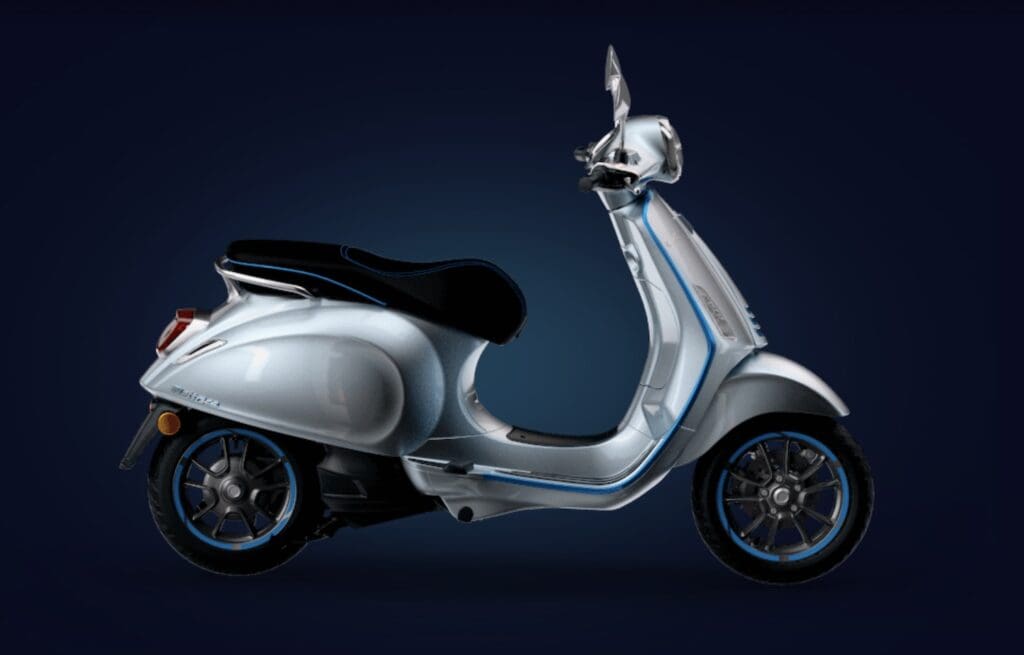

Okay, this is an electric scooter, not a motorcycle. I’m not a two-wheel, motorcycle-only snob. I’d ride a scooter. Especially one with a Vespa badge on it. Vespa sits at the top of the scooter world, with higher retention of value than any other motor vehicle on sale today. The Elettrica, is the Piaggio Group’s first stab at an electric Vespa, and it looks like a good one from a styling standpoint. The specifications aren’t too bad either.
Here’s a look at the specs:
- Motor: 4-kW maximum, 3.5 kW continuous
- Battery: 4.2 kWh
- Power: 4 kW (5.4 hp) and 148 lb-ft of torque
- Top Speed: 32 mph top speed
- Range: 60-mile range maximum
- Charging Time: 4 hours (220 volts)
Obviously, the Elettrica is an around-town vehicle. You won’t be doing any touring. The Elettrica knows what it is, and comes with some good features, including under seat storage, 4.3-inch color TFT digital dashboard, smartphone connectivity for apps and communication.
Although the Elettrica lacks the range and speed that many people want in an electric bike, the fact that it offers a very good urban commuter package is honestly pretty impressive. What’s less impressive is the price. Vespas are always expensive, and the Elettrica is no exception at $7,499. That’s a lot to pay for a scooter, but keep in mind, it will probably retain somewhere around 80 percent of its value like other Vespas, so it’s still a pretty smart buy.
4. CSC Motorcycles City Slicker
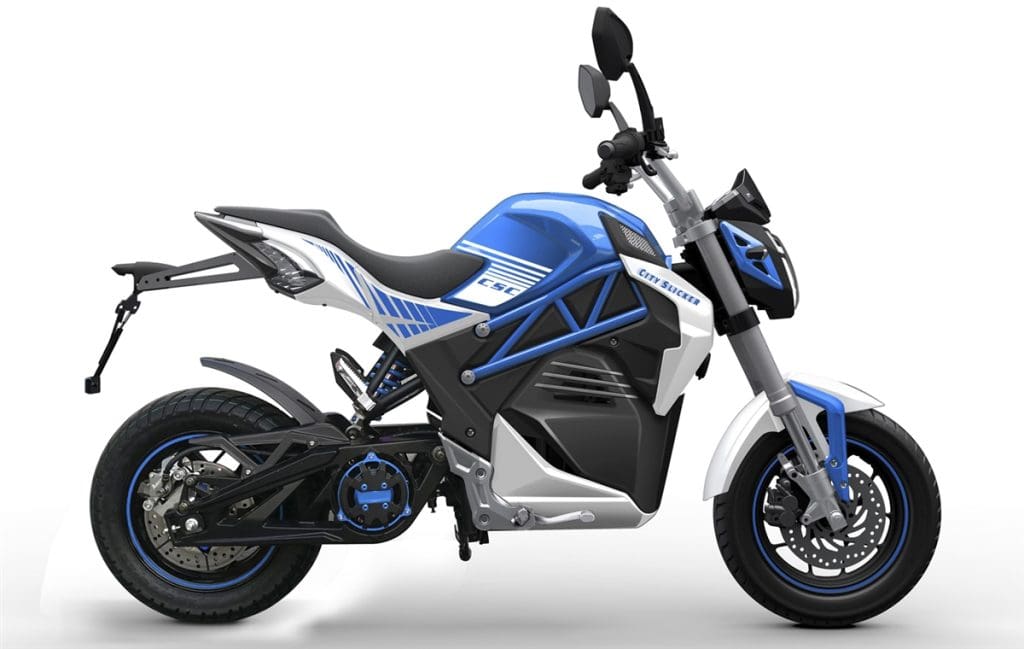

Some of you might know about the CSC City Slicker and be shaking your head at this bike, but the fact of the matter is that it’s the most affordable way to get an electric motorcycle with decent performance. It also gets decent reviews from the folks who have ridden it. Is it the most advanced? Definitely not, but it’s affordable and fun.
Here’s a quick look at the specs:
- Motor: 3.2-kW maximum, 1.5-kW continuous
- Battery: 2.1 kWh
- Power: 3.2-kW (4.3 hp)
- Top Speed: 46 mph
- Range: 62-mile range maximum
- Charge Time: 6 to 8 hours (120 volts)
While those might not be the most impressive specifications, the CSC City Slicker has a super-low $2,495 price tag. That’s cheaper than most gasoline-powered motorcycles. It also comes with features like regenerative braking, inverted telescopic front fork, rear preload adjustable monoshock suspension, and hydraulic brakes.
While it’s not a full frame motorcycle (think Honda Grom size) and not the right choice for everyone, it gets good reviews, and can’t be beaten for the price. If you need something to shoot around the city and don’t want to drop $7,500 on an electric Italian scooter, then the CSC City Slicker is a smart choice.
5. Energica Eva EsseEsse9
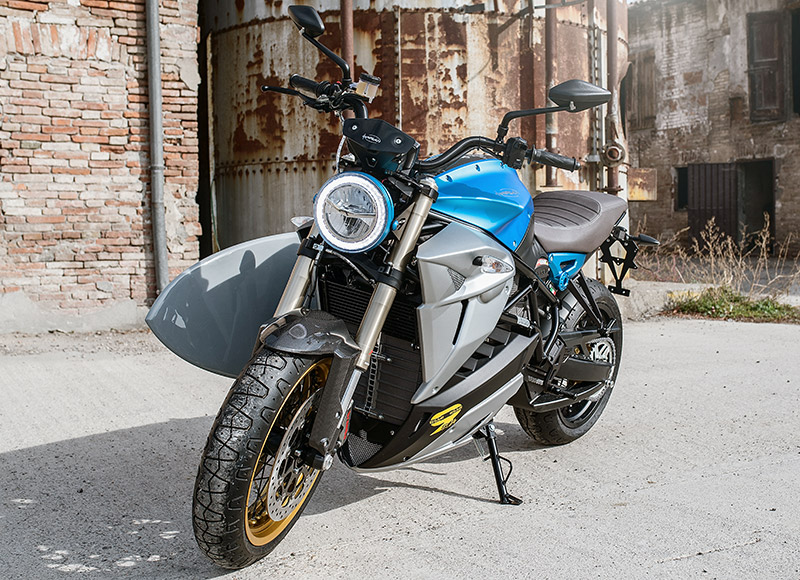

The Energica Eva EsseEsse9 is just one of three models that the company sells. All of them offer technology and stats on par or better than much of the competition. There’s a lot to love about this company and its bikes. The Eva EsseEsse9 is the bike I think is worth buying. It’s attractive styling and good stats make it an alluring possibility.
- Motor: 80 maximum, 80 continuous
- Battery: 13.4 kWh
- Power: 109 hp and 133 lb-ft of torque
- Top Speed: 125 mph top speed
- Range: 93-mile range maximum
- Charging Time: 3.5 hours (level 2 charing), 20 minutes to 85 percent (fast charging)
The EsseEsse9 is more affordable than its siblings from Energica by a little bit and offers a lot for its $20,930 price tag. The bike gets an adjustable suspension system, Bosch switchable ABS, and Brembo front and rear brakes. It also gets a TFT color display with data logging, GPS, and Bluetooth. It connects to Energica’s app which enables additional features, including showing the closest charging station.
While the range isn’t quite as good as some other bikes at this price point, as my readers have pointed out, the company deserves a spot on the list of possibilities. Honestly, any of Energica’s motorcycles could be on here. Most people would buy the Ego before this model, but I dig this one a little more. All of Energica’s bikes provide top-notch specifications for the money.
Bottom Line


Electric motorcycle technology is getting better and better every day. While motorcycles with internal combustion engines make more sense right now in terms of cost, there will come a time when they don’t.
That will be a time when charging a battery takes only a few minutes, and battery ranges and electric motor power are far beyond the current capabilities.
If you want to join the electric revolution now, you can. There are good electric motorcycles out there. Affordable ones, even, but the vast majority of them aren’t quite there yet.
The technology is moving in the right direction. I’d rather wait a few years and get something truly amazing. Make no mistake, though, electric bikes are the future whether we want them to be or not. You’ll still be able to buy an internal combustion motorcycle for many more years, but eventually, electric motorcycles will take over.


